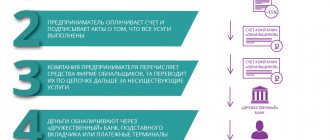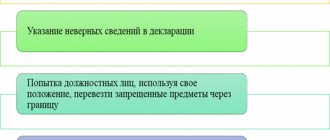1. Violation of the requirements of the currency legislation of the Russian Federation on the crediting of funds in foreign currency or the currency of the Russian Federation in large amounts from one or more non-residents to the accounts of a resident in an authorized bank or to the accounts of a resident in banks located outside the territory of the Russian Federation, in the prescribed manner , due to a resident in accordance with the terms of foreign trade agreements (contracts) for goods transferred to non-residents, work performed for them, services provided to them, information and results of intellectual activity transferred to them, including exclusive rights to them, as well as violation of the requirements of the currency legislation of the Russian Federation on the return to the Russian Federation to the resident’s accounts in an authorized bank or to the resident’s accounts in banks located outside the territory of the Russian Federation, in accordance with the established procedure, of funds in foreign currency or the currency of the Russian Federation in a large amount, paid to one or more non-residents for non-imported territory of the Russian Federation (not received on the territory of the Russian Federation) goods, uncompleted work, unprovided services, untransferred information and results of intellectual activity, including exclusive rights to them, committed by a person subject to administrative punishment for acts provided for in Part 5.2 of Article 15.25 of the Russian Code Federation on Administrative Offences, -
shall be punishable by a fine in the amount of two hundred thousand to five hundred thousand rubles, or in the amount of the wages or other income of the convicted person for a period of one to three years, or by forced labor for a term of up to three years, or by imprisonment for a term of up to three years.
1.1. Lost power. — Federal Law dated April 1, 2020 N 73-FZ.
2. Violation of the requirements of the currency legislation of the Russian Federation on the crediting of funds in foreign currency or the currency of the Russian Federation in large amounts from one or more non-residents to the accounts of a resident in an authorized bank or to the accounts of a resident in banks located outside the territory of the Russian Federation, in the prescribed manner , due to a resident in accordance with the terms of foreign trade agreements (contracts) for goods transferred to non-residents, work performed for them, services provided to them, information and results of intellectual activity transferred to them, including exclusive rights to them, as well as violation of the requirements of the currency legislation of the Russian Federation on the return to the Russian Federation to the resident’s accounts in an authorized bank or to the resident’s accounts in banks located outside the territory of the Russian Federation, in accordance with the established procedure, of funds in foreign currency or the currency of the Russian Federation in a large amount, paid to one or more non-residents for non-imported territory of the Russian Federation (not received on the territory of the Russian Federation) goods, unperformed work, unprovided services, untransferred information and results of intellectual activity, including exclusive rights to them, committed:
a) on an especially large scale;
b) by a group of persons by prior conspiracy or an organized group;
c) using a deliberately forged document;
d) using a legal entity created to commit one or more crimes related to financial transactions and other transactions with funds or other property -
shall be punishable by imprisonment for a term of up to five years with or without a fine in the amount of up to one million rubles or in the amount of the wages or other income of the convicted person for a period of up to five years.
Note. The acts provided for in this article are recognized as committed on a large scale if the amount of uncredited or unreturned funds in foreign currency or the currency of the Russian Federation for one-time or multiple currency transactions carried out within one year exceeds one hundred million rubles, and in an especially large amount - one hundred fifty million rubles.
- Article 192. Violation of the rules for the delivery of precious metals and precious stones to the state
- Article 193.1. Carrying out currency transactions to transfer funds in foreign currency or the currency of the Russian Federation to the accounts of non-residents using forged documents
Commentary to Art. 193 of the Criminal Code of the Russian Federation
The object of the crime is the established procedure for the mandatory return (repatriation) of funds in foreign currency from abroad.
In the Russian Federation, when exporting and importing goods (work, services), currency regulation and currency control are carried out over the repatriation of foreign currency earnings or the import of goods of equivalent value or the return of funds paid to non-residents.
In accordance with Art. 19 of the Federal Law of December 10, 2003 N 173-FZ “On Currency Regulation and Currency Control”, residents when carrying out foreign trade activities, unless otherwise specified in this Law, are obliged, within the time limits provided for by foreign trade agreements (contracts), to ensure: 1) receiving from non-residents to their bank accounts in authorized banks foreign currency or Russian currency due in accordance with the terms of the specified agreements (contracts) for goods transferred to non-residents, work performed for them, services provided to them, information transferred to them and results of intellectual activity, including including exclusive rights to them; 2) return to the Russian Federation of funds paid to non-residents for goods not imported into the customs territory of the Russian Federation (not received in the customs territory of the Russian Federation), work not performed, services not provided, information and results of intellectual activity not transferred, including exclusive rights to them.
———————————
RG. 2003. 17 Dec.
In relation to Art. 193 of the Criminal Code of the Russian Federation, residents are organizations created in accordance with the legislation of the Russian Federation. Non-residents are individuals who are not residents under the legislation of the Russian Federation; legal entities created in accordance with the legislation of foreign states and located outside the territory of the Russian Federation, etc. (Article 1 of the Law).
This regulatory act contains an exhaustive list of cases in which residents have the right not to credit foreign currency to their bank accounts in authorized banks: when customers (non-residents) pay local expenses of residents related to the construction by residents of facilities in the territories of foreign states - for the period of construction, according to at the end of which the remaining funds are subject to transfer to resident accounts opened with authorized banks; when using foreign currency received by residents from holding exhibitions, sports, cultural and other similar events outside the territory of the Russian Federation, to cover the costs of their holding - for the period of these events, etc. (Part 2 of Article 20 of the Law).
Authorized banks are credit organizations that carry out banking operations with funds in foreign currency on the basis of licenses from the Central Bank of the Russian Federation.
Currency control is carried out using transaction passports, which are issued when carrying out currency transactions between residents and non-residents and contain the information necessary for accounting and reporting.
Currency control is carried out by the Government of the Russian Federation, bodies (for example, the Central Bank of the Russian Federation) and agents (for example, authorized banks, customs and tax authorities) of such control.
The subject of the crime is funds in foreign currency.
Foreign currency means: 1) banknotes in the form of banknotes, treasury notes, coins that are in circulation and are legal means of cash payment in the territory of the relevant foreign state (group of foreign states), as well as those withdrawn or withdrawn from circulation, but subject to exchange, specified banknotes; 2) funds in bank accounts and bank deposits in monetary units of foreign states and international monetary or settlement units.
The objective side of the crime is expressed in inaction - failure to return funds from abroad in foreign currency, which, in accordance with the legislation of the Russian Federation, are subject to mandatory transfer to accounts in an authorized bank of the Russian Federation, the consequence in the form of a large amount, causation.
Failure to return funds in foreign currency must be understood as a person’s failure to fulfill the corresponding obligation provided for by the current legislation of the Russian Federation. The deadlines for fulfilling such obligations are specified in the foreign trade agreement (contract).
Methods of non-repayment can be very diverse (failure to take measures to collect debt, failure to issue an order to transfer funds, etc.).
Responsibility for such inaction is possible only if there is an actual opportunity to perform the necessary action. If, for example, the counterparty to an obligation does not fulfill it (due to insolvency or other circumstances), despite the actions of the resident aimed at collecting money, there will be no crime.
———————————
See: Klepitsky I.A. System of economic crimes. M., 2005. P. 441.
The crime is completed at the moment of failure to return from abroad by the head of the organization of funds in foreign currency on a large scale. The corpus delicti is material.
In accordance with the note to this article, a large amount is understood as an amount of unreturned funds in foreign currency exceeding five million rubles.
An act related to the theft of funds in foreign currency must be qualified in conjunction with Art. 160 of the Criminal Code of the Russian Federation.
The subjective side is characterized by guilt in the form of direct intent. The person realizes that he is not returning large amounts of funds from abroad in foreign currency, which, in accordance with the legislation of the Russian Federation, are subject to mandatory transfer to accounts in an authorized bank of the Russian Federation, and wishes to do so.
The subject of the crime is a special one - the head of the organization.
For failure to return from abroad funds in foreign currency that do not amount to a large amount, administrative liability is provided (parts 4 and 5 of Article 15.25 of the Code of Administrative Offenses of the Russian Federation).
Which article of the Criminal Code of the Russian Federation contains sanctions for illegal currency transactions?
Even more serious liability for carrying out illegal currency transactions is established by Art. 193, 193.1 of the Criminal Code of the Russian Federation - from large fines to imprisonment.
Under criminal liability, according to Art. 193, includes non-return from abroad of (especially) large sums in foreign currency. Unreturned money is considered to be amounts that, according to the contract, should have been credited to the resident at the authorized bank, but never reached the corresponding current accounts. If the amount of uncredited funds during the year for one-time (repeated) currency transactions exceeds 100 million rubles, it is considered that this is a major violation, and the following punishment is provided:
- a fine of 200 thousand to 500 thousand rubles, but depending on the conditions of the violation, it may entail the seizure of wages (income) for a period of 1 to 3 years, forced labor or an actual prison term of up to 3 years;
- for violations committed by a group of persons by prior conspiracy, the fine framework has been changed from 300 thousand to 500 thousand rubles, but the actual term can reach 4 years.
If the size of illegal currency transactions is equal to or greater than a particularly large amount (that is, more than 150 million rubles), a group of persons was involved in the case, a forged document was present, or an organization was used in the scheme, then the amount of sanctions will be as follows:
- up to 5 years imprisonment, fine up to 1 million rubles. or withdrawal in the same amount of salary (income) for 5 years.
Next article 193.1 of the Criminal Code of the Russian Federation regulates the transfer of foreign currency to the accounts of non-residents. If such a transfer was accompanied by the provision of false data to the bank, then the punishment may be:
- a fine of 200 thousand to 500 thousand rubles, but depending on the conditions of the violation, it may entail the seizure of wages (income) for a period of 1 to 3 years, forced labor or an actual prison term of up to 3 years.
If the violation was committed by a group of persons by agreement, on a large scale or in the scheme, an organization was specially introduced through which all transfers were made:
- up to 5 years imprisonment with a fine of up to 1 million rubles. or withdrawal of the same amount of salary (income) for 5 years.
If the size of the violation is particularly large or a group of persons participated in it:
- from 5 to 10 years imprisonment with a fine of up to 1 million rubles. or withdrawal of the same amount of salary (income) for 5 years.
Sanctions applied under Art. 193.1, refer to amounts (for one-time, repeated transactions throughout the year) that have reached a large amount, more than 9 million rubles, or especially large amounts - more than 45 million rubles.
Judicial practice under Article 193 of the Criminal Code of the Russian Federation
The appeal ruling of the Judicial Collegium for Criminal Cases of the Supreme Court of the Russian Federation dated September 13, 2018 N 33-APU18-12
Referring to the protocol for seizing the phone (vol. 2 pp. 135 - 138), indicates that it does not reflect the individual characteristics of the phone, does not The IMEI is indicated; the protocol also lacks information about the packaging and sealing of the seized phone. At the same time, according to the inspection protocol (vol. 3 pp. 189 - 190), a phone was indeed inspected of the “LG” brand, but in a non-working state and with the corresponding IMEI and with the specified modification - L 80, data on which was not in the seizure protocol . In this regard, the identity of the seized and examined phone is questioned, and K.’s testimony at the court hearing about the similarity of the phone with the stolen one could not be taken into account for the reasons stated. At the same time, he believes that the court actually conducted an identification parade, the rules for which are regulated by Art. 193 of the Criminal Code of the Russian Federation and which were violated.
Appeal ruling of the Judicial Collegium for Criminal Cases of the Supreme Court of the Russian Federation dated January 26, 2017 N 8-APU16-8
Investigative actions were carried out in accordance with the requirements of the Code of Criminal Procedure of the Russian Federation, the drawn up protocols meet the requirements of Part 9 of Art. 193 Code of Criminal Procedure of the Russian Federation. At the same time, the law does not prohibit identification of familiar persons with nicknames about whom the identifying officer previously testified in order to establish their identity, but in accordance with Part 8 of Art. 193 of the Criminal Code of the Russian Federation directly provides for the possibility of identification in conditions that exclude visual observation of the identifier by the identifiable.
Ruling of the Supreme Court of the Russian Federation dated December 14, 2020 N 309-ES19-15238 in case N A60-74988/2018
The courts came to the conclusion about the real nature of the concluded agreement for the assignment of rights of claim, also noting that the satisfaction of claims for recognition of the assignment agreement as invalid without applying the consequences of the invalidity of the imaginary transaction will not lead to a change in the rights and obligations of Pilat LLC in relation to the specified debt, to the emergence the defendant has the right to demand payment of this amount from the foreign counterparty, since the specified organization has been liquidated. This claim is not aimed at restoring civil rights and obligations under contract No. 7/2008 for the purpose of repatriating funds, but at obtaining documents and information necessary to bring the defendant to administrative charges (Part 5 of Article 15.25 of the Code of the Russian Federation on Administrative Offenses) and/or criminal (Article 193 of the Criminal Code of the Russian Federation) liability.
Cassation ruling of the Judicial Collegium for Criminal Cases of the Supreme Court of the Russian Federation dated October 29, 2020 N 38-UD20-8-K1
By the appeal ruling of the judicial panel for criminal cases of the Tula Regional Court dated November 16, 2015, the verdict regarding the conviction of Beshentsev I.V. according to Part 1 of Art. , paragraph “a”, “g”, part 4, art. 228.1 of the Criminal Code of the Russian Federation (crime of January 20, 2015 - preparation for the illegal sale of drugs weighing 2.62 and 2.26 grams) was repealed with the termination of criminal prosecution in this part. The same sentence was changed from the description of the circumstances of what I.V. Beshentsev committed. crime under Part 1 of Art. 174.1 of the Criminal Code of the Russian Federation, the no longer valid indication of the previous version of this article is excluded - “with the exception of crimes provided for in Art. 193, 194, 198, 199, 199.1, 199.2 of the Criminal Code of the Russian Federation"; Beshentsev I.V.’s sentence was commuted. according to Part 1 of Art. , part 5 art. 228.1 of the Criminal Code of the Russian Federation using Part 2 of Art. , part 2 art. Criminal Code of the Russian Federation up to 5 years of imprisonment; on the basis of Part 3 of Art. of the Criminal Code of the Russian Federation for the totality of crimes by partial addition of punishments under paragraphs “a”, “d”, part 4 of Art. 228.1 of the Criminal Code of the Russian Federation, part 3 of Art. , paragraph “a”, “g”, part 4, art. 228.1 of the Criminal Code of the Russian Federation (3 crimes), part 1 of Art. , paragraph “a”, “g”, part 4, art. 228.1 of the Criminal Code of the Russian Federation (7 crimes), part 1 of Art. , part 5 art. 228.1 of the Criminal Code of the Russian Federation, a final punishment of 10 years and 9 months of imprisonment in a high-security correctional colony was imposed. The punishment was determined under Part 1 of Art. 174.1 of the Criminal Code of the Russian Federation in the form of a fine in the amount of 60,000 rubles must be executed independently. The rest of the sentence was left unchanged.
Resolution of the Presidium of the Supreme Court of the Russian Federation dated 06/09/2021 N 146P19
Zatynaiko Vladimir Anatolyevich, ... convicted: July 12, 1993 under Part 3 of Art. 144 of the Criminal Code of the RSFSR to 4 years in prison, April 22, 1994 under Part 2 of Art. 145, part 2 art. 193 of the Criminal Code of the RSFSR using Part 3 of Art. Criminal Code of the RSFSR to 4 years 6 months in prison, released on June 7, 1997 after serving the sentence -
What is the statute of limitations for currency control authorities to hold them accountable?
The statute of limitations for prosecution for violation of currency laws in 2022 is 2 years. This time period was established in 2016; up to this point it did not exceed 1 year.
The increase was required for the reason that documents from customs authorities or banks about violations of the law were often received by Rosfinnadzor, and after its abolition - by the Federal Tax Service after the period during which violators could be held accountable had expired.
The specified two-year statute of limitations applies to prosecution for all currency violations specified in Art. 15.25 Code of Administrative Offenses of the Russian Federation. For example, this provision will affect the lack of transfer to the resident’s account of foreign exchange earnings for goods sold, and untimely reporting for conducting a currency transaction, etc. The statute of limitations in all cases is calculated from the day (date) when the illegal currency transaction was carried out.
Results
The list of violations that may result in prosecution is given in Art. 15.25 Code of Administrative Offenses of the Russian Federation. Carrying out illegal currency transactions entails bringing the violator to administrative or criminal liability. The list of sanctions includes fines and even imprisonment.
What is important to know when working with currency, read in the section “Currency Transactions” .
You can find more complete information on the topic in ConsultantPlus. Free trial access to the system for 2 days.





